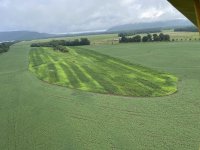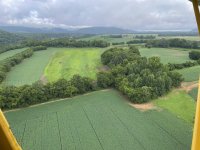Each summer Thomas and I spend a large amount of time working at the hunting property. It was a huge disappointment last fall when the farmer planted the duck ponds and then decided to harvest EVERYTHING, against our wishes and instructions. Thus leaving us with almost no food and little cover. We did plant some millet in a small spot that was too wet for the farmer and we marked off a couple moist soil areas, but that wasn't enough. Our results showed it. Worst season since building the levee and installing the control structure. What should have been a productive area saw few ducks. Have you ever seen soybean fields after they've been cut? There is no standing vegetation left. It looked like a damn sod farm.
So during one of the bird poor hunts I discussed the issue with my employer (landowner) and we came up with a game plan. With the ponds at full pool after duck season we would install t-stakes along the high water mark thereby defining perimeters. In late February Thomas and Patrick put on waders and loaded up a bunch of t-stakes and drove them into the ground. In total about 35 acres between two ponds. This spring we notified the farmer to stay out of the marked-off areas. He wasn't happy, I was. FYI, this is hunting property with some row-cropping to provide food and cover for game. Row cropping is not top priority, wildlife management is.
Our management plan was to do late drawdowns to promote moist soil vegetation and plant corn on the drier ground. We planted the larger of the two in corn and the rest is managed for moist soil. In addition to a June drawdown, we applied broadleaf herbicide in the moist soil areas to control unwanted weeds, and post-emergent and fertilizer in the corn.
The pictures below show the two ponds. The amount of native wetland grasses we have is unbelievable. I need to make a list the next time I'm out there but we have a wide variety of beneficial grasses including several types of millet, river oats, slough grass, smartweed, wild rice, barnyard grass, flatsedge, etc., etc. An amazing amount of diversity, and when combined with the food and cover corn provides, I anticipate we will hold more ducks than ever. We certainly have a lot more food and cover than ever before.
I need some up close pictures, but these two taken a couple weeks ago by my employer from his seaplane show the results of our efforts. This time of year I lose a lot of shop time working at the property. I think it might really pay off this coming season.
Eric


So during one of the bird poor hunts I discussed the issue with my employer (landowner) and we came up with a game plan. With the ponds at full pool after duck season we would install t-stakes along the high water mark thereby defining perimeters. In late February Thomas and Patrick put on waders and loaded up a bunch of t-stakes and drove them into the ground. In total about 35 acres between two ponds. This spring we notified the farmer to stay out of the marked-off areas. He wasn't happy, I was. FYI, this is hunting property with some row-cropping to provide food and cover for game. Row cropping is not top priority, wildlife management is.
Our management plan was to do late drawdowns to promote moist soil vegetation and plant corn on the drier ground. We planted the larger of the two in corn and the rest is managed for moist soil. In addition to a June drawdown, we applied broadleaf herbicide in the moist soil areas to control unwanted weeds, and post-emergent and fertilizer in the corn.
The pictures below show the two ponds. The amount of native wetland grasses we have is unbelievable. I need to make a list the next time I'm out there but we have a wide variety of beneficial grasses including several types of millet, river oats, slough grass, smartweed, wild rice, barnyard grass, flatsedge, etc., etc. An amazing amount of diversity, and when combined with the food and cover corn provides, I anticipate we will hold more ducks than ever. We certainly have a lot more food and cover than ever before.
I need some up close pictures, but these two taken a couple weeks ago by my employer from his seaplane show the results of our efforts. This time of year I lose a lot of shop time working at the property. I think it might really pay off this coming season.
Eric


Last edited:

